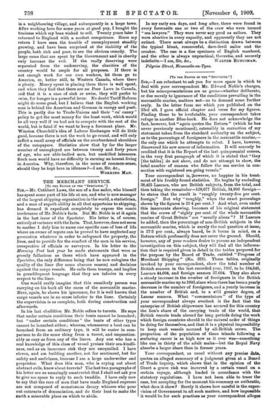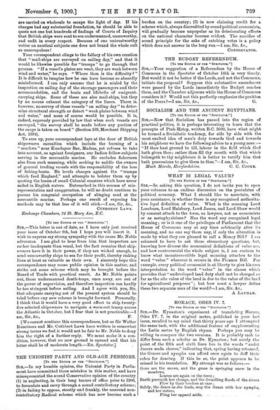rTo TES EDITOR Or TEE "SPECTATOR.") SIE, - I am reluctant to
ask you for more space in which to deal with your correspondent Mr. Edward Noble's charges, but his misrepresentations are so gross--whether deliberate, or due merely to ignorance of the conditions prevailing in the mercantile marine, matters not—as to demand some further reply. In the letter from me which you published on the 23rd ult. I gave official chapter and verse for my figures. Finding these to be irrefutable, your correspondent takes refuge in another Blue-book. He does not acknowledge the fact, however, but "again quotes the Return" (which he has never previously mentioned), ostensibly in correction of my statement taken from the standard authority on the subject, as to the percentage of foreigners in the mercantile marine,— the only one which he attempts to rebut. I have, however, discovered his new source of information. It will scarcely be credited that it is the Report of the last quinquennial census, in the very first paragraph of which it is stated that "they [the tables] do not show, and do not attempt to show, the total number of seamen who follow the sea service in con- nection with registered sea-going vessels."
Your correspondent is, [however, no happier in his treat- ment of his freshly found statistics. He begins by excluding 38,425 Lascars, who are British subjects, from the total, and then taking the remainder-128,077 British, 34,906 foreign— he states that the result is "roughly twenty-five per cent. foreign." But why "roughly," when the exact percentage shown by the figures is 21.4 per cent.? And what, even under this inaccurate showing, becomes of his original statement that the crews of "eighty per cent. of the whole mercantile marine of Great Britain" are "usually aliens "? If Lascars be added, then the percentage of non-British subjects in the mercantile marine, which is surely the real question at issue, is 171 per cent., always based, be it borne in mind, on a Return which professedly does not cover the ground. Should, however, any of your readers desire to pursue an independent investigation on this subject, they will find all the informa- tion that is required given in detail in the tables prepared for the purpose by the Board of Trade, entitled "Progress of Merchant Shipping" (No. 375). These tables, originally invoked by your correspondent, show the total number of British seamen in the last recorded year, 1907, to be 194,848, Lascars 44,604, and foreign seamen 37,694. They also show a steady increase in the number of foreigners in the British mercantile marine up to 1903, since when there has been a yearly decrease in the number of foreigners, and a yearly increase in the number of British and, to a still greater degree, of Lascar seamen. What " commentators " of the type of your correspondent always overlook is the fact that the enterprise of British shipowners has secured for this country the lion's share of the carrying trade of the world, that British vessels trade abroad for long periods doing the work which foreign countries should in the natural order of things be doing for themselves, and that it is a physical impossibility to keep such vessels manned by all-British crews. The proportion of the population of these islands following a seafaring career is as high now as it ever was--something like one in thirty of the adult males—but the Royal Navy absorbs a larger share than in former years.
Your correspondent, as usual without any precise data, quotes an alleged summary of a judgment given at a Board of Trade inquiry, which shows that in the opinion of the Court a grave risk was incurred by a certain vessel on a certain voyage, although loaded in accordance with the statutory regulations. I have not been able to trace the case, but accepting for the moment his summary as authentic, what doss it show P Surely it shows bow careful is the supers vision of Government in all such matters, and how impossible it would. be for such practices as your correspondent alleges
are carried on wholesale to escape the light of day. If his charges had any substantial foundation, he should be able. to quote not one but hundreds of findings of Courts of Inquiry that British ships were sent to sea undermanned, unseaworthy, and unfit in every respect. Because of one untrustworthy writer on nautical subjects one does not brand the whole cult as unscrupulous !
Your correspondent clings to the fallacy of his own creation that "mail-ships are surveyed on sailing day," and that it would be likewise possible for "tramps" to go through that process. "If a vessel's plates are weak, they are weak between wind and water," he says. "Where then is the difficulty?" It is difficult to imagine how he can have become so absurdly misinformed. I can only assume that he is misled by the inspection on sailing day of the steerage passengers and their accommodation, and the boats and lifebelts of emigrant- carrying ships. Some of these are also mail-ships, but they by no means exhaust the category of the liners. Them is, however, no survey of these vessels "on sailing day" to deter- mine structural strength or detect "weak plates between wind and water," and none of course would be possible. It is, indeed, expressly provided by law that when such vessels are surveyed, "the survey shall be made before any portion of the cargo is taken on board" (Section 289, Merchant Shipping Act, 1894).
To sum up, your correspondent lays at the door of British shipowners casualties which include the burning of a " muchwa " near Kundapur Bar, Madras, yet refuses to take into account, as against foreigners, our Indian fellow-subjects serving in the mercantile marine. He excludes fishermen also from such manning, while seeking to saddle the owners of general trading vessels with the responsibility of the loss of fishing-boats. He levels charges against the "tramps which feed England," and attempts to bolster them up by quoting the losses of small Colonial coasters which have never sailed in English waters. Entrenched in this morass of mis- representation and exaggeration, he will no doubt continue to pursue his congenial occupation of slinging mud at the mercantile marine. Perhaps one result of exposing his methods may be that less of it will stick.—I am, Sir, &c., CUTHBERT Laws.
Exchange Chambers, 24 St. Mary Axe, E.C.































































 Previous page
Previous page